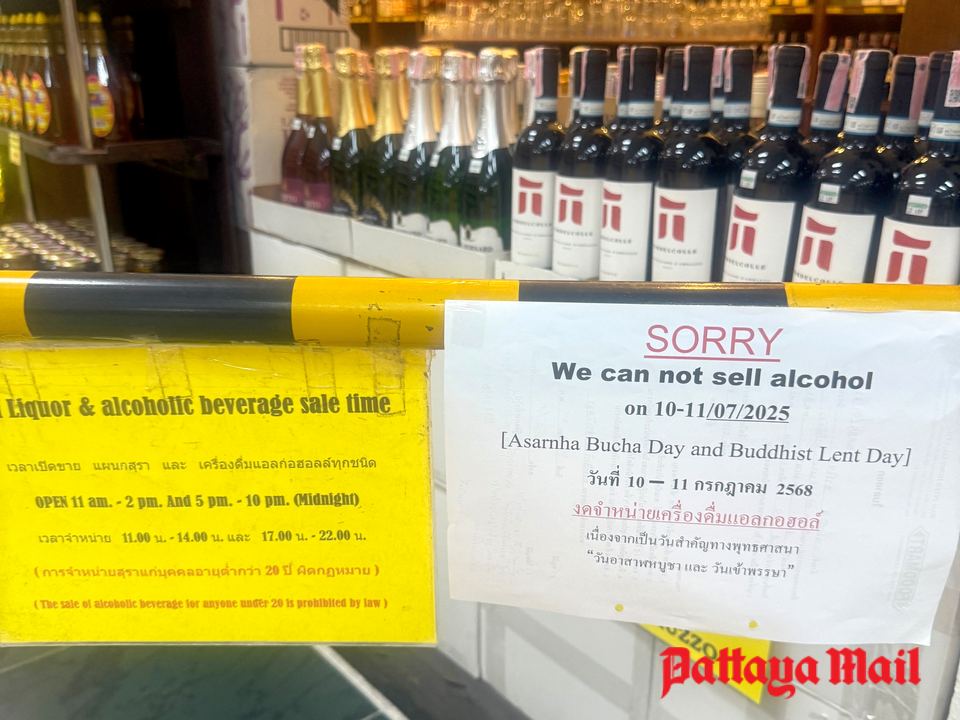Brits baffled by booze boost brawl
A Jomtien supermarket reminds customers of the sales restrictions.
A brief argument broke out in a Jomtien supermarket after customers were told it was a no-alcohol purchase day. Sales staff told them that Thursday July 10 and Friday July 11 were traditional Buddhist holidays and that dry days were a sign of respect. But a British couple responded at the check-out that they had just visited a nightclub and been served a beer and a gin and tonic without a murmur. The argument was settled amicably by a Thai policeman off-duty.
The confusion arose because of recently-introduced, national changes to the alcohol control act of 2008. These now allow some venues to bypass the old restrictions: specifically hotels registered under the Hotel Act, licensed entertainment venues and restaurants with music licences – all with the proviso they are in a recognized tourist zone. There are also exemptions for departing passengers on international flights and a very limited loophole at Hua Lampong railway terminal in Bangkok. But you cant drink on railway journeys.
However, there are no sales improvements of any kind for retail outlets: supermarkets, megastores, convenience stores, mama and papa outlets. They are still forbidden to sell alcohol on Buddha days and, on ordinary days, are restricted to the hours 11.00 – 14.00 hours and 17.00 – 23.00 hours. These timing restrictions were introduced by a post-coup military junta 40 years ago to discourage office workers from taking too long over their lunch breaks. The restrictions were ignored for decades before being resuscitated after the 2014 coup d’etat.
There is ongoing confusion about which restaurants can now serve alcohol on religious holidays. Some sources say its ok as long as the venue can show a music licence, but others argue actual entertainment or a party must actually be in progress for booze to be served. As regards bars and clubs, there is no actual list of approved tourist zones actually in place. Informally, Pattaya police have usually regarded the entire city of Pattaya as a zone, which leaves the so-called Dark Side covering some Banglamung districts still marked by sullen ambiguity.
The Tourist Authority of Thailand says that the new rules nationally reflect current realities whilst promoting public safety and responsible tourism. Critics might say they are an unsuccessful attempt to satisfy both liberal and conservative wings in Thai government without pleasing either group. Separately, Thailand is currently facing a separate set of challenges with its new cannabis policy which will require sales points to become medical dispensaries with a qualified and trained doctor on hand to fill in the approval forms to specify the “illness” of the customer. However, there is currently a grace period for cannabis-orientated businesses and cafes to review their personal situation.
Thailand offers a striking contrast with Cambodia where there are no alcohol timing restrictions currently in place. Booze is available 24/7, wherever a venue is open, except temporarily during elections or after the death of somebody very prominent indeed. However, Phnom Penh authorities are beginning to tighten the rules at the margin in an attempt to protect youth, discourage public drunkenness and reduce road fatalities. For example, police are currently removing booze advertising hoardings in streets and on motorways, whilst snappy beercan rings can no longer promote alcohol or award prizes. According to Pale Ale Travel, legislation to set a minimum drinking age and ban alcohol near schools and health clinics has been stuck in the Cambodian parliament for 10 years.



